 |
May 2025
Free trade zones (FTZs) and trans-shipment operations are important tools for facilitating global trade and attracting investment. However, they may also pose challenges for the effective monitoring and enforcement of environmental regulations. This new information note, developed under the Green Customs Initiative, with contributions from the BRS Secretariat, explores the implications of FTZs and trans-shipment activities in the context of Multilateral Environmental Agreements (MEAs). Drawing on inputs from multiple MEA Secretariats, the note highlights potential compliance risks and identifies mechanisms and good practices to mitigate them. It offers practical insights for customs authorities, enforcement agencies, and policymakers to enhance oversight and support the implementation of MEAs, including the Basel, Rotterdam, and Stockholm Conventions.
| Download |
| English: |
 |
|
|
Information Note: Free trade zones, trans-shipment and multilateral environmental agreements
Free trade zones (FTZs) and trans-shipment operations are important tools for facilitating global trade and attracting investment. However, they may also pose challenges for the effective monitoring and enforcement of environmental regulations. This new information note, developed under the Green Customs Initiative, with contributions from the BRS Secretariat, explores the implications of FTZs and trans-shipment activities in the context of Multilateral Environmental Agreements (MEAs). Drawing on inputs from multiple MEA Secretariats, the note highlights potential compliance risks and identifies mechanisms and good practices to mitigate them. It offers practical insights for customs authorities, enforcement agencies, and policymakers to enhance oversight and support the implementation of MEAs, including the Basel, Rotterdam, and Stockholm Conventions.
| Download |
| English: |
 |
|
|
|
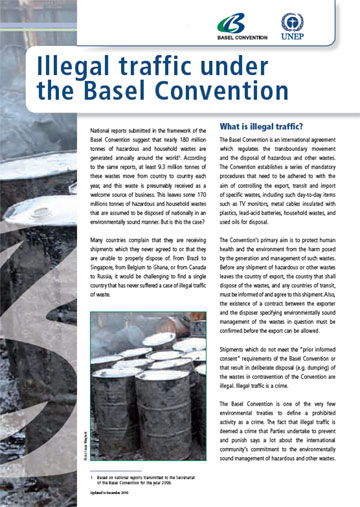 |
May 2025
Illegal traffic under the Basel Convention
|
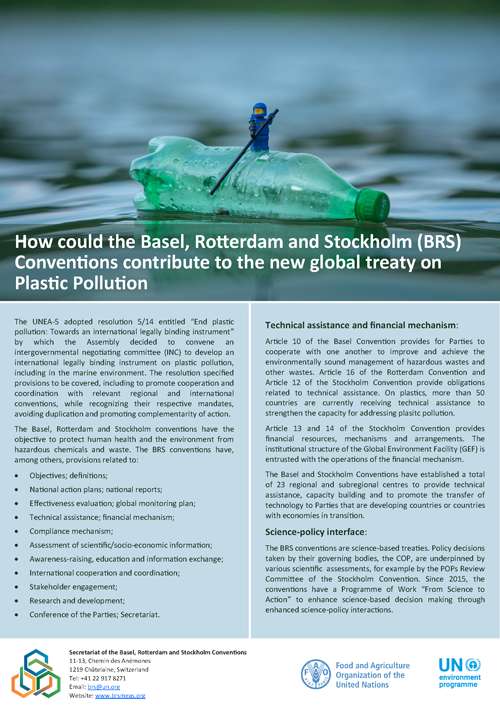 |
May 2022
| Download |
| English: |

|
How could the Basel, Rotterdam and Stockholm (BRS) Conventions contribute to the new global treaty on Plastic Pollution
The UNEA-5 adopted resolution 5/14 entitled “End plastic pollution: Towards an international legally binding instrument” by which the Assembly decided to convene an intergovernmental negotiating committee (INC) to develop an international legally binding instrument on plastic pollution, including in the marine environment. The resolution specified provisions to be covered, including to promote cooperation and coordination with relevant regional and international conventions, while recognizing their respective mandates, avoiding duplication and promoting complementarity of action.
| Download |
| English: |

|
|
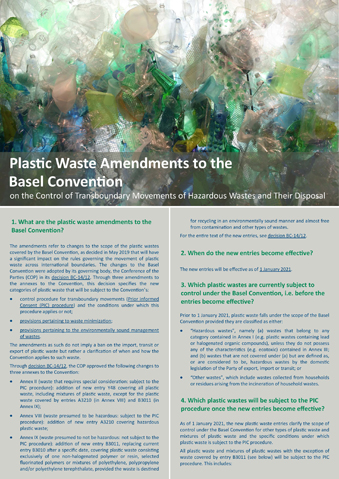 |
March 2021
| Download |
| English: |

|
Plastic waste amendments to the Basel Convention FAQs
The amendments refer to changes to the scope of the plastic wastes covered by the Basel Convention, as decided in May 2019 that will have a significant impact on the rules governing the movement of plastic waste across international boundaries. The changes to the Basel Convention were adopted by its governing body, the Conference of the Parties (COP) in its decision BC-14/12.
| Download |
| English: |

|
|
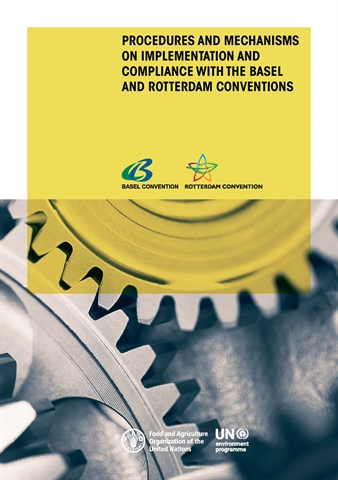 |
January 2020
| Download |
| Arabic: |
 |
French: |
 |
| Chinese: |
 |
Russian: |
 |
| English: |
 |
Spanish: |
 |
Procedures and Mechanisms on Implementation and Compliance with the Basel and Rotterdam Conventions
|
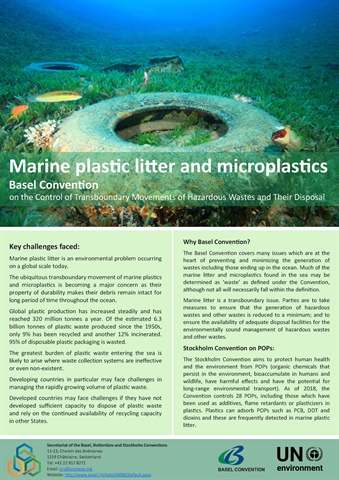 |
May 2018
| Download |
| English: |

|
Marine plastic litter and microplastics
Marine plastic litter is an environmental problem occurring on a global scale today.
The ubiquitous transboundary movement of marine plastics and microplastics is becoming a major concern as their property of durability makes their debris remain intact for long period of time throughout the ocean.
| Download |
| English: |

|
|
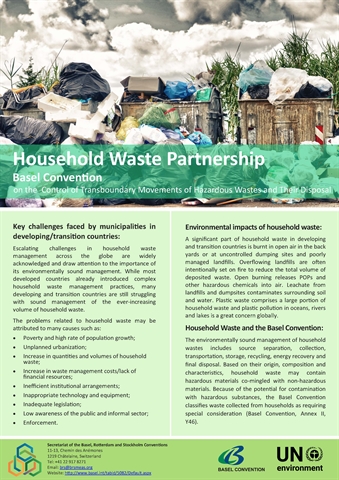 |
May 2018
| Download |
| English: |

|
Household Waste Partnership
Escalating challenges in household waste management across the globe are widely acknowledged and draw attention to the importance of its environmentally sound management. While most developed countries already introduced complex household waste management practices, many developing and transition countries are still struggling with sound management of the ever-increasing volume of household waste.
| Download |
| English: |

|
|
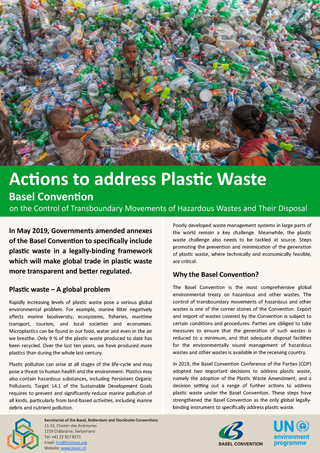 |
May 2018
| Download |
| English: |

|
Actions to address Plastic Waste
In May 2019, Governments amended annexes of the Basel Convention to specifically include plastic waste in a legally-binding framework which will make global trade in plastic waste more transparent and better regulated.
| Download |
| English: |

|
|
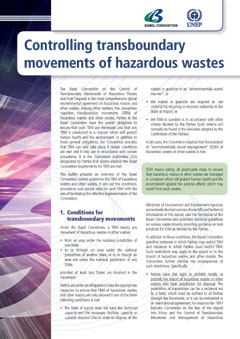 |
March 2015
| Download |
| Arabic |
 |
French: |
 |
| Chinese |
 |
Russian: |
 |
| English: |
 |
Spanish: |
 |
Controlling transboundary movements of hazardous wastes
|
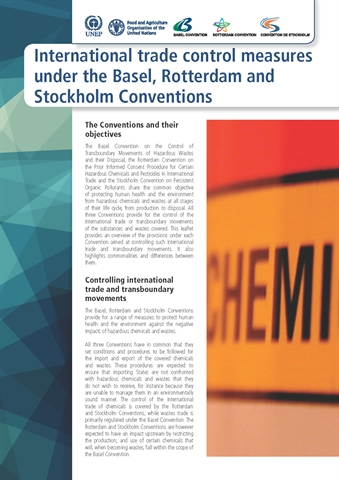 |
March 2015
International trade control measures under the Basel, Rotterdam and Stockholm Conventions
|
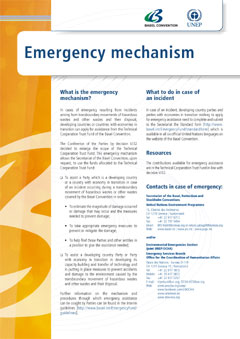 |
April 2013
| Download |
| English: |
 |
|
|
Emergency mechanism
In cases of emergency resulting from incidents arising from transboundary movements of hazardous wastes and other wastes and their disposal, developing countries or countries with economies in transition can apply for assistance from the Technical Cooperation Trust Fund of the Basel Convention.
| Download |
| English: |
 |
|
|
|
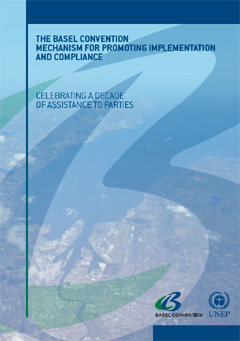 |
May 2012
| Download |
| Arabic: |
 |
French: |
 |
| Chinese: |
 |
Russian: |
 |
| English: |
 |
Spanish: |
 |
The Basel Convention mechanism for promoting the implementation and compliance - Celebrating a decade of assistance to Parties
|
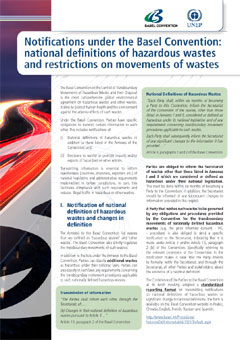 |
December 2011
| Download |
| English: |
 |
Spanish: |
 |
| French: |
 |
|
Notifications under the Basel Convention: national definitions of hazardous wastes and restrictions on movements of wastes
The overarching objective of the Basel Convention is to protect human health and the environment against the adverse effects of hazardous wastes. Under the Basel Convention, Parties have specific obligations to transmit certain information to each other. This includes notifications of national definitions of hazardous wastes in addition to those listed in the annexes of the Convention; and decisions to restrict or prohibit imports and/or exports of hazardous or other wastes. The current leaflet provides information about these notifications in a concise manner.
| Download |
| English: |
 |
Spanish: |
 |
| French: |
 |
|
|
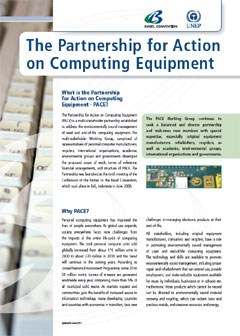 |
June 2011
| Download |
| Arabic: |
 |
French: |
 |
| Chinese: |
 |
Russian: |
 |
| English: |
 |
Spanish: |
 |
The Partnership for Action on Computing Equipment
The Partnership for Action on Computing Equipment (PACE) is a multi-stakeholder partnership established to address the environmentally sound management of used and end-of-life computing equipment. The multi-stakeholder Working Group, comprised of representatives of personal computer manufacturers, recyclers, international organizations, academia, environmental groups and governments developed the proposed scope of work, terms of reference, financial arrangements, and structure of PACE. The Partnership was launched at the ninth meeting of the Conference of the Parties to the Basel Convention, which took place in Bali, Indonesia in June 2008.
| Download |
| Arabic: |
 |
French: |
 |
| Chinese: |
 |
Russian: |
 |
| English: |
 |
Spanish: |
 |
|
 |
December 2010
Illegal traffic under the Basel Convention
|
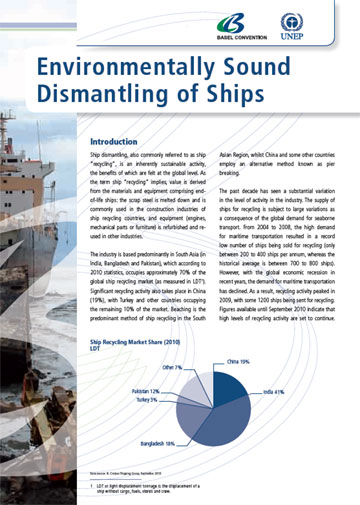 |
December 2010
| Download |
| English: |
 |
Environmentally sound dismantling of ships
 Ship dismantling, also commonly referred to as ship “recycling”, is an inherently sustainable activity, the benefits of which are felt at the global level. As the term ship “recycling” implies, value is derived from the materials and equipment comprising end of life ships: the scrap steel is melted down and is commonly used in the construction industries of ship recycling countries, and equipment (engines, mechanical parts or furniture) is refurbished and reused in other industries.
The industry is based predominantly in South Asia (in India, Bangladesh and Pakistan), which according to 2010 statistics, occupies approximately 70% of the global ship recycling market. Significant recycling activity also takes place in China (19%), with Turkey and other countries occupying the remaining 10% of the market. Beaching is the predominant method of ship recycling in the South Asian Region, whilst China and some other countries employ an alternative method known as pier breaking.
The past decade has seen a substantial variation in the level of activity in the industry. The supply of ships for recycling is subject to large variations as a consequence of the global demand for seaborne transport. From 2004 to 2008, the high demand for maritime transportation resulted in a record low number of ships being sold for recycling (only between 200 to 400 ships per annum, whereas the historical average is between 700 to 800 ships).
However, with the global economic recession in recent years, the demand for maritime transportation has declined. As a result, recycling activity peaked in 2009, with some 1200 ships being sent for recycling. Figures available until September 2010 indicate that high levels of recycling activity are set to continue.
| Download |
| English: |
 |
|
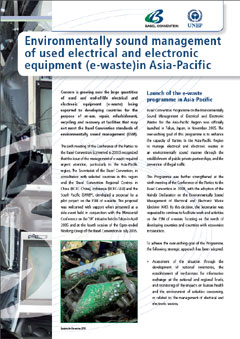 |
December 2010
| Download |
| English: |
 |
Environmentally sound management of used electrical and electronic equipment (e-waste) in Asia-Pacific
Concern is growing over the large quantities of used and end-of-life electrical and electronic equipment (e-waste) being exported to developing countries for the purpose of re-use, repair, refurbishment, recycling and recovery at facilities that may not meet the Basel Convention standards of environmentally sound management (ESM).
| Download |
| English: |
 |
|
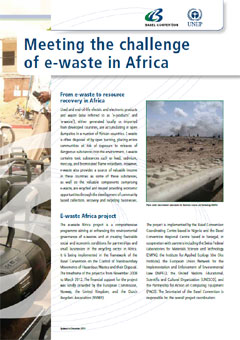 |
December 2010
| Download |
| English: |
 |
Meeting the challenge of e-waste in Africa
Used and end-of-life electric and electronic products and waste (also referred to as ‘e-products’ and ‘e-waste‘), either generated locally or imported from developed countries, are accumulating in open dumpsites in a number of African countries. E-waste is often disposed of by open burning, placing entire communities at risk of exposure to releases of dangerous substances into the environment. E-waste contains toxic substances such as lead, cadmium, mercury, and brominated flame retardants. However, e-waste also provides a source of valuable income in these countries as some of these substances, as well as the valuable components comprising e-waste, are recycled and reused providing economic opportunities through the development of community based collection, recovery and recycling businesses.
| Download |
| English: |
 |
|
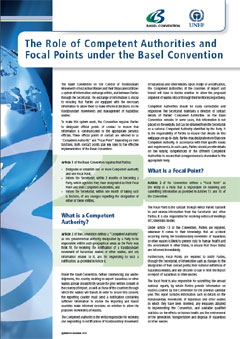 |
December 2010
| Download |
| Arabic: |
 |
French: |
 |
| Chinese: |
 |
Russian: |
 |
| English: |
 |
Spanish: |
 |
The role of competent authorities and focal points under the Basel Convention
|
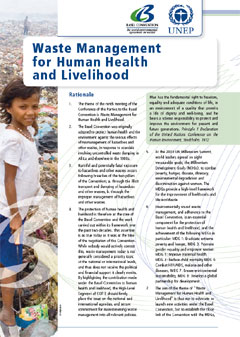 |
May 2008
| Download |
| English: |
 |
Waste management for human health and livelihood
| Download |
| English: |
 |
|